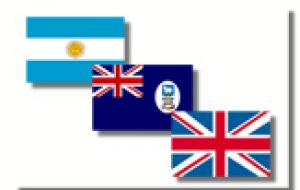MercoPress. South Atlantic News Agency
Cristina K travels to London and will press Malvinas issue

Argentine president Cristina Fernandez de Kirchner confirmed Thursday morning that she will be visiting London on April 4/5 to participate in a Progressive leaders meeting, while government officials and the Buenos Aires press underline that the “unflagging” Malvinas sovereignty claim will be “put on the table”.
Mrs. Kirchner was invited to the non-government political summit by British Labor leader PM Gordon Brown who is hosting the meeting to address the issue of "Social inclusion and globalization". Sixteen heads of government are expected to participate including presidents from Brazil, Chile and Uruguay. "I'm certain that under any hypothesis the Malvinas issue will be present and so will the unflagging rights of Argentina over the Islands", said cabinet chief Alberto Fernandez who added that Mrs. Kirchner is not traveling to London on a government visit, "but to a meeting of world progressive leaders". Fernandez said the Argentine president was not going to London "forgetting about our Malvinas claim" underlining that "with England it's clear that our rights over the Malvinas are inalienable". "Bilateral relations exist, even when there's a conflicting issue which obviously exists" said the cabinet chief, who then compared the Malvinas situation with the current bilateral relation with Uruguay and the Botnia pulp mill. "Although we will continue to insist that the pulp mill was built in violation of the River Uruguay treaty, in spite of this one must keep thinking about links and relations with Uruguay on other issues", he emphasized. The decision to fly to London was announced following a 45 minute morning meeting with Foreign Affairs minister Jorge Taiana. Apparently President Cristina Fernandez de Kirchner not only has plans for a private meeting with PM Gordon Brown but also to extend her visit to include other European countries, particularly Spain and possibly France. The Buenos Aires press expanding on leaks from diplomatic sources speculate that the trip is seen as a "good opportunity to defreeze" relations with Britain that suffered extensively in 2007 when Argentina unilaterally terminated the 1995 South Atlantic oil agreement with the UK and London announced its intention of claiming sea shelf rights off Antarctica and South Atlantic islands. Mrs. Kirchner is also interested in talking with PM Brown about facilitating humanitarian flights to the Falklands from mainland Argentina for Malvinas war fallen next of kin and veterans to participate in the delayed inauguration of the Argentine cemetery in Darwin. Last January the Argentine president met with a delegation of Malvinas war dead relatives and veterans and promised to help with the humanitarian flights for the inauguration of the cemetery, which was finished in April 2004. A task the Islanders consider a logistics nightmare since it involves flying in and accommodating over a thousand people, when the total population of the Islands is 2.600. The British government has said all along that "the event is a summit of political parties convened by the leader of the UK's Labor Party, Gordon Brown" The Buenos Aires press revealed that Mrs. Kirchner will be traveling to London with the recently named ambassador in Washington Hector Timmerman who will be acting as a "Sherpa" in diplomatic terms. His task will be to support the president and help explain to the other world leaders and officials the position of Argentina in the different issues. The term refers to the Nepalese guides who help climbers in the Himalayan region. Mrs. Kirchner --as First Lady-- played this very role in 2003 when a recently elected president Nestor Kirchner went through a similar experience on an invitation from then Labor leader and PM Tony Blair. She made a speech on extreme poverty and indigence in the Southern Cone compared to the experience in the so called "central (industrialized) countries" while her husband tried to advance on the Malvinas claim in private talks with PM Blair. According to the Argentine press at one moment in the 2003 private meeting Kirchner told Blair that he grew up in a province (Santa Cruz) looking out to the sea where the Argentine claimed Malvinas islands are located, "a very sensitive and personal issue". The reply was a simple "I understand what you mean", but that was it. But even admitting certain parallelisms, Cristina Fernandez seems better prepared that her husband back in 2003. He had only been in office two months, had never traveled to Europe, was impatient and uncomfortable about foreign affairs and in a week was given a tour of London, Brussels, Paris and Madrid. Mrs. Kirchner is well traveled, (some claim too much), she has promised to make foreign affairs a leading concern of her administration, has the advantage of experience collected during her husband's four years in office, will have been five months in office on arriving in London and in a sensitive month for the Argentine calendar, two days after the 26th anniversary of the Falklands invasion on April 2 by the Argentine military dictatorship of the time. The question is then not what outcome, in the event of a Mrs. Kirchner-Brown progressive leaders private meeting, could have for the Malvinas sovereignty claim (none as long as the Islanders wish to remain under British sovereignty) but what could evolve concerning the humanitarian flights for Malvinas war next of kin and veterans to the Falklands for the official opening of the Argentine cemetery. Argentine officials and media feel encouraged with their free interpretation of some phrases in PM Brown's New Year message and Minister Meg Munn statements during a recent visit to the Falklands.




Top Comments
Disclaimer & comment rulesCommenting for this story is now closed.
If you have a Facebook account, become a fan and comment on our Facebook Page!